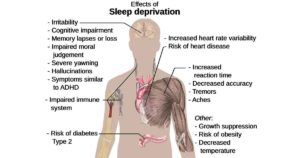Differences in your bedtime and wakeup routine could throw your wellness out of whack.
- A recent study in Diabetes Care found that varying your sleep habits, like by going to bed or waking up earlier or later than usual, can put you at risk for multiple metabolic abnormalities.
- Varying your falling asleep time or sleep duration by just an hour can lead to up to 27 percent increased risk of health issues like obesity, high blood pressure, and lower levels of HDL cholesterol.
When you’re zonked from a week full of work deadlines and runs, you may be tempted to shut off the alarm when the weekend finally rolls in to catch up on some shuteye. But that may not bring the health boost your think: Varying your sleep schedule can put you at risk of a bunch of metabolic abnormalities, a new studypublished in Diabetes Care suggests.
In the study, researchers recruited 2,000 participants to see whether those with irregular sleep were more likely to also have metabolic syndrome—a cluster of conditions including high blood pressure, high cholesterol, central obesity, and high blood sugar, which raises your risk of stroke, heart attack, and type 2 diabetes. They also recruited 900 people without the condition, and followed them up for six years to see whether those with irregular sleep were more likely to develop the condition.
They measured sleep over seven days to gauge an average of how much their sleep varied from their average sleep. For example, if a person had an average sleep duration of seven hours over one week, a one-hour variability in sleep duration means that the average of their sleep per night would shake out to one hour off that weekly average. That could mean they were sleeping for six hours half the nights and eight the other half. Same holds true for sleep onset time, or the time a person actually fell asleep.
When they crunched the numbers for the first group, the researchers discovered that people who had a one-hour to 1.5-hour variability in sleep duration were 27 percent more likely to have metabolic syndrome than those with a sleep variability of less than one hour.
Same held true for the second group: For every one-hour increase in sleep variability, the participants were 27 percent more likely to develop metabolic syndrome over followup. They also found a 23 percent increased risk with a one-hour variability in when they actually fell asleep.
People with irregular sleep patterns were also more likely to simultaneously have or develop four or all five of the metabolic abnormalities studied—lower HDL (good) cholesterol, and higher waist circumference, blood pressure, total triglycerides, and fasting glucose levels, explained study author Tianyi Huang, Sc.D., epidemiologist of the Channing Division of Network Medicine at Brigham and Women’s Hospital in Boston.
[Run faster, stronger, and longer with this 360-degree training program.]
The reason varied sleep might throw your metabolic processes out of wack? Most metabolic processes have circadian rhythms, and work differently when you are asleep and awake. They need to follow their biologic clock in order to have normal functioning. Sleep is the most important behavior to synchronize all these metabolic processes and make the metabolic clock tick on time, Huang said.

“Regular sleep would also put other behaviors in order, such as when to have breakfast, when to work, exercise, and relax, whether to snack at night, so on,” Huang said. “Sleep could influence metabolic health through influencing these behaviors.”



Recent Comments